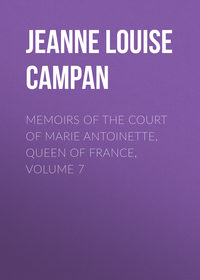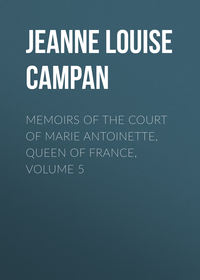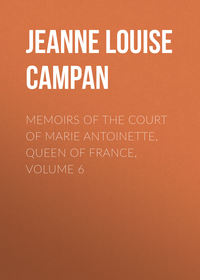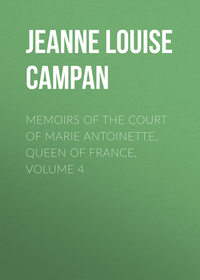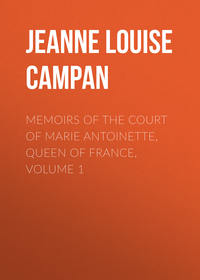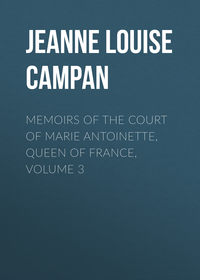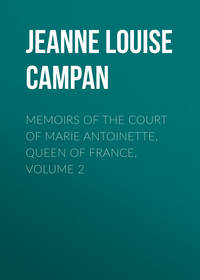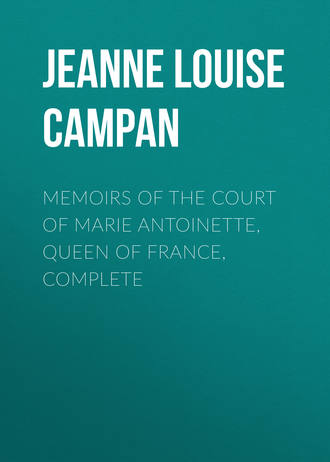 полная версия
полная версияMemoirs of the Court of Marie Antoinette, Queen of France, Complete
Madame Adelaide had more mind than Madame Victoire; but she was altogether deficient in that kindness which alone creates affection for the great, abrupt manners, a harsh voice, and a short way of speaking, rendering her more than imposing. She carried the idea of the prerogative of rank to a high pitch. One of her chaplains was unlucky enough to say ‘Dominus vobiscum’ with rather too easy an air; the Princess rated him soundly for it after mass, and told him to remember that he was not a bishop, and not again to think of officiating in the style of a prelate.
Mesdames lived quite separate from the King. Since the death of Madame de Pompadour he had lived alone. The enemies of the Duc de Choiseul did not know in what department, nor through what channel, they could prepare and bring about the downfall of the man who stood in their way. The King was connected only with women of so low a class that they could not be made use of for any delicate intrigue; moreover, the Parc-aux-Cerfs was a seraglio, the beauties of which were often replaced; it was desirable to give the King a mistress who could form a circle, and in whose drawing-room the long-standing attachment of the King for the Duc de Choiseul might be overcome. It is true that Madame du Barry was selected from a class sufficiently low. Her origin, her education, her habits, and everything about her bore a character of vulgarity and shamelessness; but by marrying her to a man whose pedigree dated from 1400, it was thought scandal would be avoided. The conqueror of Mahon conducted this coarse intrigue.
[It appeared at this period as if every feeling of dignity was lost. “Few noblemen of the French Court,” says a writer of the time, “preserved themselves from the general corruption. The Marechal de Brissac was one of the latter. He was bantered on the strictness of his principles of honour and honesty; it was thought strange that he should be offended by being thought, like so many others, exposed to hymeneal disgrace. Louis XV., who was present, and laughed at his angry fit, said to him: ‘Come, M. de Brissac, don’t be angry; ‘tis but a trifling evil; take courage.’—‘Sire,’ replied M. de Brissac, ‘I possess all kinds of courage, except that which can brave shame.’”—NOTE BY THE EDITOR.]
Such a mistress was judiciously selected for the diversion of the latter years of a man weary of grandeur, fatigued with pleasure, and cloyed with voluptuousness. Neither the wit, the talents, the graces of the Marquise de Pompadour, her beauty, nor even her love for the King, would have had any further influence over that worn-out being.
He wanted a Roxalana of familiar gaiety, without any respect for the dignity of the sovereign. Madame du Barry one day so far forgot propriety as to desire to be present at a Council of State. The King was weak enough to consent to it. There she remained ridiculously perched upon the arm of his chair, playing all sorts of childish monkey tricks, calculated to please an old sultan.
Another time she snatched a packet of sealed letters from the King’s hand. Among them she had observed one from Comte de Broglie. She told the King that she knew that rascal Broglie spoke ill of her to him, and that for once, at least, she would make sure he should read nothing respecting her. The King wanted to get the packet again; she resisted, and made him run two or three times round the table, which was in the middle of the council-chamber, and then, on passing the fireplace, she threw the letters into the grate, where they were consumed. The King became furious; he seized his audacious mistress by the arm, and put her out of the door without speaking to her. Madame du Barry thought herself utterly disgraced; she returned home, and remained two hours, alone, abandoned to the utmost distress. The King went to her; she threw herself at his feet, in tears, and he pardoned her.
Madame la Marechale de Beauvau, the Duchesse de Choiseul, and the Duchesse de Grammont had renounced the honour of the King’s intimate acquaintance rather than share it with Madame du Barry. But a few years after the death of Louis XV., Madame la Marechale being alone at the Val, a house belonging to M. de Beauvau, Mademoiselle de Dillon saw the Countess’s calash take shelter in the forest of St. Germain during a violent storm. She invited her in, and the Countess herself related these particulars, which I had from Madame de Beauvau.
The Comte du Barry, surnamed ‘le roue’ (the profligate), and Mademoiselle du Barry advised, or rather prompted, Madame du Barry in furtherance of the plans of the party of the Marechal de Richelieu and the Duc d’Aiguillon. Sometimes they even set her to act in such a way as to have a useful influence upon great political measures. Under pretence that the page who accompanied Charles I. in his flight was a Du Barry or Barrymore, they persuaded the Comtesse du Barry to buy in London that fine portrait which we now have in the Museum. She had the picture placed in her drawing-room, and when she saw the King hesitating upon the violent measure of breaking up his Parliament, and forming that which was called the Maupeou Parliament, she desired him to look at the portrait of a king who had given way to his Parliament.
[The “Memoirs of General Dumouriez,” vol. i., page 142, contain some curious particulars about Madame Du Barry; and novel details respecting her will be found at page 243 of “Curiosites Historiques,” by J. A. Le Rol (Paris, Plon, 1864). His investigations lead to the result that her real name was Jean Becu, born, 19th August, 1743, at Vaucouleurs, the natural daughter of Anne Becu, otherwise known as “Quantiny.” Her mother afterwards married Nicolas Rancon. Comte Jean du Barry met her among the demi-monde, and succeeded, about 1767, and by the help of his friend Label, the valet de chambre of Louis XV., in introducing her to the King under the name of Mademoiselle l’Ange. To be formally mistress, a husband had to be found. The Comte Jean du Barry, already married himself, found no difficulty in getting his brother, Comte Guillaume, a poor officer of the marine troops, to accept the post of husband. In the marriage-contract, signed on 23d July, 1768, she was described as “the daughter of Anne Becu and of an imaginary first husband, Sieur Jean Jacques Gomard de Vaubernier,” and three years were taken off her age. The marriage-contract was so drawn as to leave Madame du Barry entirely free from all control by her husband. The marriage was solemnised on 1st September, 1768, after which the nominal husband returned to Toulouse. Madame du Barry in later years provided for him; and in 1772, tired of his applications, she obtained an act of separation from him. He married later Jeanne Madeleine Lemoine, and died in 1811. Madame du Barry took care of her mother, who figured as Madame de Montrable. In all, she received from the King, M. Le Roi calculates, about twelve and a half millions of livres. On the death of Louis XV. she had to retire first to the Abbey of Pont-aux-Dames, near Meaux, then she was allowed to go to her small house at St. Vrain, near Arpajon, and, finally, in 1775, to her chateau at Louveciennes. Much to her credit be it said, she retained many of her friends, and was on the most intimate terms till his death with the Duc de Brissac (Louis Hercule Timoldon de Cosse-Brissac), who was killed at Versailles in the massacre of the prisoners in September, 1792, leaving at his death a large legacy to her. Even the Emperor Joseph visited her. In 1791 many of her jewels were stolen and taken to England. This caused her to make several visits to that country, where she gained her suit. But these visits, though she took every precaution to legalise them, ruined her. Betrayed by her servants, among them by Zamor, the negro page, she was brought before the Revolutionary tribunal, and was guillotined on 8th December, 1793, in a frenzy of terror, calling for mercy and for delay up to the moment when her head fell.]
The men of ambition who were labouring to overthrow the Duc de Choiseul strengthened themselves by their concentration at the house of the favourite, and succeeded in their project. The bigots, who never forgave that minister the suppression of the Jesuits, and who had always been hostile to a treaty of alliance with Austria, influenced the minds of Mesdames. The Duc de La Vauguyon, the young Dauphin’s governor, infected them with the same prejudices.
Such was the state of the public mind when the young Archduchess Marie Antoinette arrived at the Court of Versailles, just at the moment when the party which brought her there was about to be overthrown.
Madame Adelaide openly avowed her dislike to a princess of the House of Austria; and when M. Campan, my father-in-law, went to receive his orders, at the moment of setting off with the household of the Dauphiness, to go and receive the Archduchess upon the frontiers, she said she disapproved of the marriage of her nephew with an archduchess; and that, if she had the direction of the matter, she would not send for an Austrian.
CHAPTER II
MARIE ANTOINETTE JOSEPHE JEANNE DE LORRAINE, Archduchess of Austria, daughter of Francois de Lorraine and of Maria Theresa, was born on the 2d of November, 1755, the day of the earthquake at Lisbon; and this catastrophe, which appeared to stamp the era of her birth with a fatal mark, without forming a motive for superstitious fear with the Princess, nevertheless made an impression upon her mind. As the Empress already had a great number of daughters, she ardently desired to have another son, and playfully wagered against her wish with the Duc de Tarouka, who had insisted that she would give birth to an archduke. He lost by the birth of the Princess, and had executed in porcelain a figure with one knee bent on the earth, and presenting tablets, upon which the following lines by Metastasio were engraved:
I lose by your fair daughter’s birthWho prophesied a son;But if she share her mother’s worth,Why, all the world has won!The Queen was fond of talking of the first years of her youth. Her father, the Emperor Francis, had made a deep impression upon her heart; she lost him when she was scarcely seven years old. One of those circumstances which fix themselves strongly in the memories of children frequently recalled his last caresses to her. The Emperor was setting out for Innspruck; he had already left his palace, when he ordered a gentleman to fetch the Archduchess Marie Antoinette, and bring her to his carriage. When she came, he stretched out his arms to receive her, and said, after having pressed her to his bosom, “I wanted to embrace this child once more.” The Emperor died suddenly during the journey, and never saw his beloved daughter again.
The Queen often spoke of her mother, and with profound respect, but she based all her schemes for the education of her children on the essentials which had been neglected in her own. Maria Theresa, who inspired awe by her great qualities, taught the Archduchesses to fear and respect rather than to love her; at least I observed this in the Queen’s feelings towards her august mother. She therefore never desired to place between her own children and herself that distance which had existed in the imperial family. She cited a fatal consequence of it, which had made such a powerful impression upon her that time had never been able to efface it.
The wife of the Emperor Joseph II. was taken from him in a few days by an attack of smallpox of the most virulent kind. Her coffin had recently been deposited in the vault of the imperial family. The Archduchess Josepha, who had been betrothed to the King of Naples, at the instant she was quitting Vienna received an order from the Empress not to set off without having offered up a prayer in the vault of her forefathers. The Archduchess, persuaded that she should take the disorder to which her sister-in-law had just fallen a victim, looked upon this order as her death-warrant. She loved the young Archduchess Marie Antoinette tenderly; she took her upon her knees, embraced her with tears, and told her she was about to leave her, not for Naples, but never to see her again; that she was going down then to the tomb of her ancestors, and that she should shortly go again there to remain. Her anticipation was realised; confluent smallpox carried her off in a very few days, and her youngest sister ascended the throne of Naples in her place.
The Empress was too much taken up with high political interests to have it in her power to devote herself to maternal attentions. The celebrated Wansvietten, her physician, went daily, to visit the young imperial family, and afterwards to Maria Theresa, and gave the most minute details respecting the health of the Archdukes and Archduchesses, whom she herself sometimes did not see for eight or ten days at a time. As soon as the arrival of a stranger of rank at Vienna was made known, the Empress brought her family about her, admitted them to her table, and by this concerted meeting induced a belief that she herself presided over the education of her children.
The chief governesses, being under no fear of inspection from Maria Theresa, aimed at making themselves beloved by their pupils by the common and blamable practice of indulgence, so fatal to the future progress and happiness of children. Marie Antoinette was the cause of her governess being dismissed, through a confession that all her copies and all her letters were invariably first traced out with pencil; the Comtesse de Brandes was appointed to succeed her, and fulfilled her duties with great exactness and talent. The Queen looked upon having been confided to her care so late as a misfortune, and always continued upon terms of friendship with that lady. The education of Marie Antoinette was certainly very much neglected. With the exception of the Italian language, all that related to belles lettres, and particularly to history, even that of her own country, was almost entirely unknown to her. This was soon found out at the Court of France, and thence arose the generally received opinion that she was deficient in sense. It will be seen in the course of these “Memoirs” whether that opinion was well or ill founded. The public prints, however, teemed with assertions of the superior talents of Maria Theresa’s children. They often noticed the answers which the young Princesses gave in Latin to the harangues addressed to them; they uttered them, it is true, but without understanding them; they knew not a single word of that language.
Mention was one day made to the Queen of a drawing made by her, and presented by the Empress to M. Gerard, chief clerk of Foreign Affairs, on the occasion of his going to Vienna to draw up the articles for her marriage-contract. “I should blush,” said she, “if that proof of the quackery of my education were shown to me. I do not believe that I ever put a pencil to that drawing.” However, what had been taught her she knew perfectly well. Her facility of learning was inconceivable, and if all her teachers had been as well informed and as faithful to their duty as the Abbe Metastasio, who taught her Italian, she would have attained as great a superiority in the other branches of her education. The Queen spoke that language with grace and ease, and translated the most difficult poets. She did not write French correctly, but she spoke it with the greatest fluency, and even affected to say that she had lost German. In fact she attempted in 1787 to learn her mother-tongue, and took lessons assiduously for six weeks; she was obliged to relinquish them, finding all the difficulties which a Frenchwoman, who should take up the study too late, would have to encounter. In the same manner she gave up English, which I had taught her for some time, and in which she had made rapid progress. Music was the accomplishment in which the Queen most delighted. She did not play well on any instrument, but she had become able to read at sight like a first-rate professor. She attained this degree of perfection in France, this branch of her education having been neglected at Vienna as much as the rest. A few days after her arrival at Versailles, she was introduced to her singing-master, La Garde, author of the opera of “Egle.” She made a distant appointment with him, needing, as she said, rest after the fatigues of the journey and the numerous fetes which had taken place at Versailles; but her motive was her desire to conceal how ignorant she was of the rudiments of music. She asked M. Campan whether his son, who was a good musician, could give her lessons secretly for three months. “The Dauphiness,” added she, smiling, “must be careful of the reputation of the Archduchess.” The lessons were given privately, and at the end of three months of constant application she sent for M. la Garde, and surprised him by her skill.
The desire to perfect Marie Antoinette in the study of the French language was probably the motive which determined Maria Theresa to provide for her as teachers two French actors: Aufresne, for pronunciation and declamation, and Sainville, for taste in French singing; the latter had been an officer in France, and bore a bad character. The choice gave just umbrage to our Court. The Marquis de Durfort, at that time ambassador at Vienna, was ordered to make a representation to the Empress upon her selection. The two actors were dismissed, and the Princess required that an ecclesiastic should be sent to her. Several eminent ecclesiastics declined taking upon themselves so delicate an office; others who were pointed out by Maria Theresa (among the rest the Abbe Grisel) belonged to parties which sufficed to exclude them.
The Archbishop of Toulouse one day went to the Duc de Choiseul at the moment when he was much embarrassed upon the subject of this nomination; he proposed to him the Abby de Vermond, librarian of the College des Quatre Nations. The eulogistic manner in which he spoke of his protege procured the appointment for the latter on that very day; and the gratitude of the Abbe de Vermond towards the prelate was very fatal to France, inasmuch as after seventeen years of persevering attempts to bring him into the ministry, he succeeded at last in getting him named Comptroller-General and President of the Council.—[Comte de Brienne, later Archbishop of Sens.]
This Abbe de Vermond directed almost all the Queen’s actions. He established his influence over her at an age when impressions are most durable; and it was easy to see that he had taken pains only to render himself beloved by his pupil, and had troubled himself very little with the care of instructing her. He might have even been accused of having, by a sharp-sighted though culpable policy, purposely left her in ignorance. Marie Antoinette spoke the French language with much grace, but wrote it less perfectly. The Abbe de Vermond revised all the letters which she sent to Vienna. The insupportable folly with which he boasted of it displayed the character of a man more flattered at being admitted into her intimate secrets than anxious to fulfil worthily the high office of her preceptor.
[The Abbe de Vermond encouraged the impatience of etiquette shown by Marie Antoinette while she was Dauphiness. When she became Queen he endeavoured openly to induce her to shake off the restraints she still respected. If he chanced to enter her apartment at the time she was preparing to go out, “For whom,” he would say, in a tone of raillery, “is this detachment of warriors which I found in the court? Is it some general going to inspect his army? Does all this military display become a young Queen adored by her subjects?” He would call to her mind the simplicity with which Maria Theresa lived; the visits she made without guards, or even attendants, to the Prince d’Esterhazy, to the Comte de Palfi, passing whole days far from the fatiguing ceremonies of the Court. The Abbe thus artfully flattered the inclinations of Marie Antoinette, and showed her how she might disguise, even from herself, her aversion for the ceremonies observed by the descendants of Louis XIV.-MADAME CAMPAN.]
His pride received its birth at Vienna, where Maria Theresa, as much to give him authority with the Archduchess as to make herself acquainted with his character, permitted him to mix every evening with the private circle of her family, into which the future Dauphiness had been admitted for some time. Joseph II., the elder Archduchess, and a few noblemen honoured by the confidence of Maria Theresa, composed the party; and reflections on the world, on courts, and the duties of princes were the usual topics of conversation. The Abbe de Vermond, in relating these particulars, confessed the means which he had made use of to gain admission into this private circle. The Empress, meeting him at the Archduchess’s, asked him if he had formed any connections in Vienna. “None, Madame,” replied he; “the apartment of the Archduchess and the hotel of the ambassador of France are the only places which the man honoured with the care of the Princess’s education should frequent.” A month afterwards Maria Theresa, through a habit common enough among sovereigns, asked him the same question, and received precisely the same answer. The next day he received an order to join the imperial family every evening.
It is extremely probable, from the constant and well-known intercourse between this man and Comte de Mercy, ambassador of the Empire during the whole reign of Louis XVI., that he was useful to the Court of Vienna, and that he often caused the Queen to decide on measures, the consequences of which she did not consider. Not of high birth, imbued with all the principles of the modern philosophy, and yet holding to the hierarchy of the Church more tenaciously than any other ecclesiastic; vain, talkative, and at the same time cunning and abrupt; very ugly and affecting singularity; treating the most exalted persons as his equals, sometimes even as his inferiors, the Abbe de Vermond received ministers and bishops when in his bath; but said at the same time that Cardinal Dubois was a fool; that a man such as he, having obtained power, ought to make cardinals, and refuse to be one himself.
Intoxicated with the reception he had met with at the Court of Vienna, and having till then seen nothing of high life, the Abbe de Vermond admired no other customs than those of the imperial family; he ridiculed the etiquette of the House of Bourbon incessantly; the young Dauphiness was constantly incited by his sarcasms to get rid of it, and it was he who first induced her to suppress an infinity of practices of which he could discern neither the prudence nor the political aim. Such is the faithful portrait of that man whom the evil star of Marie Antoinette had reserved to guide her first steps upon a stage so conspicuous and so full of danger as that of the Court of Versailles.
It will be thought, perhaps, that I draw the character of the Abbe de Vermond too unfavourably; but how can I view with any complacency one who, after having arrogated to himself the office of confidant and sole counsellor of the Queen, guided her with so little prudence, and gave us the mortification of seeing that Princess blend, with qualities which charmed all that surrounded her, errors alike injurious to her glory and her happiness?
While M. de Choiseul, satisfied with the person whom M. de Brienne had presented, despatched him to Vienna with every eulogium calculated to inspire unbounded confidence, the Marquis de Durfort sent off a hairdresser and a few French fashions; and then it was thought sufficient pains had been taken to form the character of a princess destined to share the throne of France.
The marriage of Monseigneur the Dauphin with the Archduchess was determined upon during the administration of the Duc de Choiseul. The Marquis de Durfort, who was to succeed the Baron de Breteuil in the embassy to Vienna, was appointed proxy for the marriage ceremony; but six months after the Dauphin’s marriage the Duc de Choiseul was disgraced, and Madame de Marsan and Madame de Guemenee, who grew more powerful through the Duke’s disgrace, conferred that embassy, upon Prince Louis de Rohan, afterwards cardinal and grand almoner.
Hence it will be seen that the Gazette de France is a sufficient answer to those libellers who dared to assert that the young Archduchess was acquainted with the Cardinal de Rohan before the period of her marriage. A worse selection in itself, or one more disagreeable to Maria Theresa, than that which sent to her, in quality, of ambassador, a man so frivolous and so immoral as Prince Louis de Rohan, could not have been made. He possessed but superficial knowledge upon any subject, and was totally ignorant of diplomatic affairs. His reputation had gone before him to Vienna, and his mission opened under the most unfavourable auspices. In want of money, and the House of Rohan being unable to make him any considerable advances, he obtained from his Court a patent which authorised him to borrow the sum of 600,000 livres upon his benefices, ran in debt above a million, and thought to dazzle the city and Court of Vienna by the most indecent and ill-judged extravagance. He formed a suite of eight or ten gentlemen, of names sufficiently high-sounding; twelve pages equally well born, a crowd of officers and servants, a company of chamber musicians, etc. But this idle pomp did not last; embarrassment and distress soon showed themselves; his people, no longer receiving pay, in order to make money, abused the privileges of ambassadors, and smuggled with so much effrontery that Maria Theresa, to put a stop to it without offending the Court of France, was compelled to suppress the privileges in this respect of all the diplomatic bodies, a step which rendered the person and conduct of Prince Louis odious in every foreign Court.


